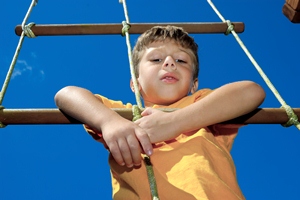Bullying and ADHD

Jacob is a funny, energetic sixth grader who was diagnosed with ADHD in second grade. He is a bit awkward around the other students in his classroom, but the teacher reports that he is a pleasure to have in class and has one friend that he spends time with at recess. Jacob has accommodations at school to help him stay organized and on task and was doing well up until the second half of the school year. Jacob’s parents noticed that he was more moody and anxious about going to school than usual and seemed to blow up at them over seemingly nothing. They were concerned, but brushed it off as typical pre-teen behavior until a note came home from the teacher that he hadn’t been putting in his usual effort at school.
Later that night, Jacob’s parents sat him down, prepared to implement a strict homework routine, but when they asked the question, “What is going on at school,” they were met with an unexpected flood of tears. Jacob tearfully gushed about how there was a boy at school that tormented him on a daily basis. The bully called him names in front of the other kids and told them all not to play with him at recess. The one friend he did have was avoiding him, as well.
Jacob was too embarrassed to tell anyone about it and was afraid he would make things worse if he were to be a “tattletale.” He tried to ignore it as long as he could, but it was making him miserable on the inside and so he began to crumble on the outside. He showed all of the classic signs of a victim of bullying: moodiness, anxiety, fear of school, and unexplained anger.
Any child can become the victim of bullying, but Jacob is at higher risk because of his ADHD. The outward symptoms of ADHD, such as impulsivity, hyperactivity, or intensity stand out as different from others. Plus, the reaction to the bullying is likely either extreme emotion or extreme passivity. Either way, it will stand out to a bully, who thrives on that power.
Jacob’s parents were shocked that his bullying could be so severe and immediately tried to comfort him, but were at a loss as to how to help.
If you are like Jacob’s parents and your child is being victimized by a bully, here are some strategies to help:
1. Praise your child for coming forward about the bullying. Validate your child’s feelings and reassure him/her that it was the right thing to do in coming forward.
2. Get all of the details and write them down. Try to get a timeline of events. Encourage your child to be honest about his/her actions and reactions to the bullying. Remind your child that he/she needs to be honest about his/her own mistakes so that you can help heal the situation.
3. Contact the principal, school counselor, and teacher to devise an action plan. Share with them all of the details. Tell them you do NOT want peer mediation and that putting the victim and the bully in the same room to “work it out” will further traumatize your child and likely exacerbate the bullying situation once they leave the mediation.
4. Teach your child about bullies. Share your own experiences and outcomes. Explain to your child that children often bully because they have low self-esteem. Remind your child that it doesn’t excuse the behavior. It is just reinforcement that there is nothing “wrong” with your child.
5. Create a positive social experience for your child. Invite another child or two over to play. Do all you can to make it a great play date.
6. Build on your child’s strengths. Engage your child in any activity that he/she enjoys to reinforce that he/she is special and wonderful no matter what the bully says.
7. Tell your child that you love them and that you always will.








